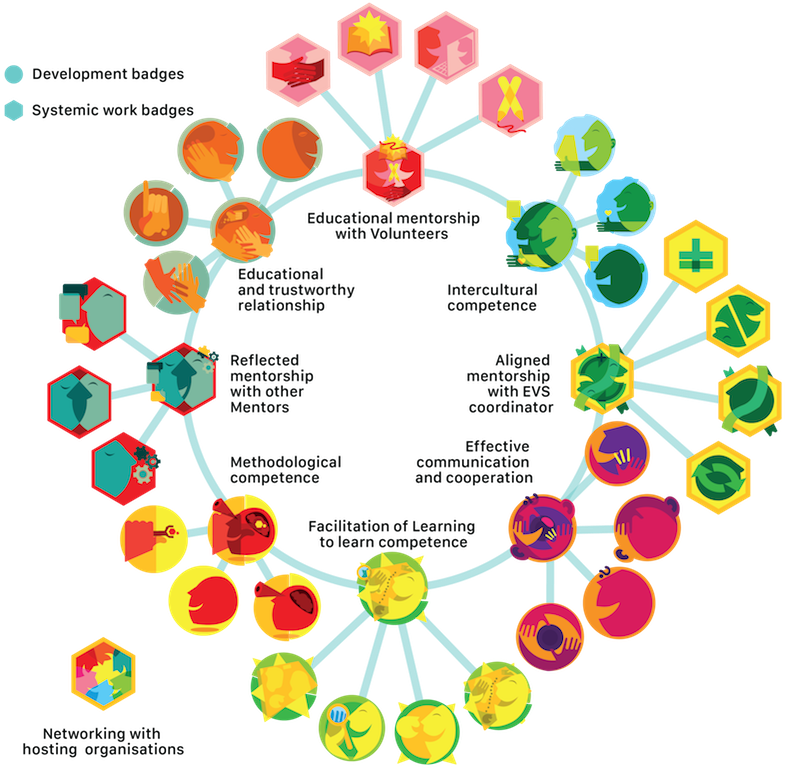European Voluntary Service Mentors badges
The context
European Voluntary Service (EVS) is a mobility programme for young people, supported by Erasmus+ programme. Through EVS young people get the opportunity to volunteer abroad, contributing with their efforts to a cause they believe in – be it solidarity with refugees and migrants, work on environmental issues, activities for children or the elderly, support for non-governmental organisations, work for cultural events or a number of other topics.
 The mentor is a key actor in EVS: his/her role is to provide to the volunteer the on going personal support throughout the duration of the activity, which is one of the main responsibilities of organisations participating in EVS. The role of the mentor is like a shadow- invisible- but always present, helping to put various pictures together and see bigger and different perspectives, whose role is to support socially, emotionally, culturally and learning-wise a foreign volunteer; encourage and evaluate the learning process as well as creating supportive and trust atmosphere in goal setting of the volunteer.
The mentor is a key actor in EVS: his/her role is to provide to the volunteer the on going personal support throughout the duration of the activity, which is one of the main responsibilities of organisations participating in EVS. The role of the mentor is like a shadow- invisible- but always present, helping to put various pictures together and see bigger and different perspectives, whose role is to support socially, emotionally, culturally and learning-wise a foreign volunteer; encourage and evaluate the learning process as well as creating supportive and trust atmosphere in goal setting of the volunteer.
Aims and logic of the badge system
Open badges system for European Voluntary Service (EVS) mentors aims to motivate mentors in keeping up systematic work with EVS volunteers as well as to guide mentors through their development within specific mentors’ competence areas. By using this badge system both organization and mentors can easily display EVS mentors’ achievements. The system is divided into two main areas:
- Twenty three professional development badges
- Fifteen systemic work badges
Professional development badges
These are the badges related to the development of EVS mentors within five competence areas: (1) Methodological, (2) Intercultural, (3) Educational relationship, (4) Facilitation of learning to learn, (5) Communication and cooperation competences.
Mentors can choose any badge to start with and accomplish number of quests, reflect on their experience while working with EVS volunteers during the entire project and achieve digital open badges verifying Mentor’s professional development. Some badges are based on self-assessment and reflection, while other ones are issued after the confirmation of the EVS coordinator working with mentors.
Badges can be earned in any sequence and process of badge earning is not time bonded. If a person earned all badges of the same competence area, one unlocks a meta-badge. Mentors can continually develop their professional competences next years and they will receive ‘Year 2”, “Year 3”, etc. badges with additional evidence based on new experience gained through mentoring EVS volunteers.
Systemic work badges
Badges of this area are related to 4 functions of a mentor: (1) Cooperation and reflection of mentorship practices with EVS coordinator; (2) Ongoing support and contact with the EVS volunteer; (3) Ongoing cooperation, learning and supporting in cooperation with other mentors, and (4) Cooperation with the hosting organization(s).
These badges are mainly relevant if EVS organization has more than one mentor and several hosting organisations. In this case organisation has more than one mentor and it aims to ensure that trainers keep contact among themselves, with coordinating organisation as well as with EVS volunteer and hosting organisation. Badges are earned by providing evidence of attending training workshops, meetings with peer mentors or volunteers.